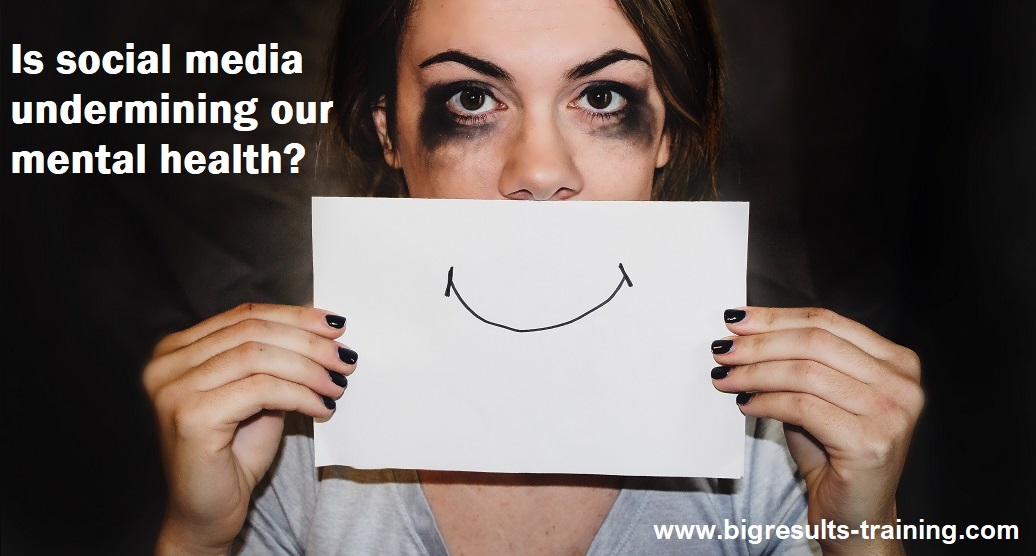
Mental Health and Social Media – is this the perfect storm?
I recently ran a Mental Health Awareness training workshop for a brilliant group of people. One of the key questions was “is Social Media undermining mental health”. Following on from the course, I felt the need to write a blog and unpick this very timely question more thoroughly. Answering the question: is social media undermining mental health?
First the science: Research on Social Media undermining Mental Health
There are numerous studies about Social Media undermining our mental health.
A study published in Current Opinion in Psychology showed envying your friends on Facebook can lead to depression. The study showed:
- Facebook use has recently been linked to depression and negative affectivity.
- Unflattering social comparison and envy are common experiences for Facebook users.
- Envy and social comparison mediate correlations between Facebook use and depression.
A study in the American Journal of Epidemiology which assessed 5,208 subjects found that regular use of Facebook, overall, had a negative impact on an individual’s wellbeing.
According to a study by the University of Copenhagen many people suffer from “Facebook envy”. The study showed that those who abstained from using Facebook claimed to feel more satisfied with their lives.
The screen both reflects, and forms a barrier.
HOW THE SCREEN REFLECTS – SOCIAL COMPARISON.

When we see others living their best lives online, it’s easy to feel that our lives are not as good.
- social comparison – looking at our friends and neighbours as benchmarks for our success. The average Facebook user can see into the lives of 338 friends. That’s a lot of people (living their “best” screen lives) that we compare to.
- As people tend to live their best lives online – people watching on may assume their Facebook friends had better lives. And feelings of envy increased their chances of developing depression.
- self-acceptance and self-esteem are crucial for good mental health. So when we compare ourselves and our lives to others, we can undermine our self esteem, and give ourselves feelings of inadequacy
- In competition with others – and ourselves? Who is having the best life? This can cause a anxiety/stress – both of which are counterproductive to good mental health.
- “When we derive a sense of worth based on how we are doing relative to others, we place our happiness in a variable that is completely beyond our control,” Dr Tim Bono, author of When Likes Aren’t Enough explained in Healthista.
HOW THE SCREEN IS A BARRIER TO OUR WELLBEING

Online life is a barrier to “real life”
Human connection
Humans are tribe animals. It’s important for us to be able to connect and communicate with each other. But when we’re glued to our phone or tablet, our only connection is going to be limited and 2-dimensional. Missing out on our “real” lives. Missing out on the real lives of our friends.
Meaningful community activities.
Community activities isn’t just about connection to friends – it’s doing something meaningful in the community, as a community. For example, campaigning, gardening, meeting and supporting others less fortunate. The very physical part of being “part of the community”.
Getting outdoors
Being in nature is great for our mental health – but it’s not as easy to see the screen when you’re in the sun, so typically we’ll spend time indoors and away from the fresh air, sunshine (or rain).
Memory
It’s great to look back on our photos and events via social media. But this can also distort the way in which we remember. (Bear in mind too, that if all our digital lives are stored on one social media platform – what happens if that social media platform is withdrawn or disappears overnight?)
Activity
Watching a screen means you won’t be walking, swimming, cycling, going to the gym, all of which can affect both our physical and mental health. An example of how social media can affect our physical health as well as social media undermining our mental health.
Learning
Yes, you’ll be picking up random bits of content, but these are unlikely to hang together well and certainly don’t represent the learning you could do from a classroom course or even an online course. Learning is a key element of our well-being.
Sleeping
Sleep is vital for our mental health, but too often we’ll have screentime before bedtime, which can prevent our brains from resting. Blue light from devices can suppress melatonin (the hormone we release to sleep) and social media “dramas” can keep our brain on high alert.
Focusing
Our attention is now less than that of a goldfish according to Microsoft corp. Microsoft claims that our attention span has dropped to just 8 seconds, down from 12 seconds in 2000. (Goldfishes are typically assumed to have 9 second spans). A number of studies since claim otherwise, though all agree that our attention and focus has dropped, and we are training our brains to adopt a “monkey mind” by switching between media/screens with a dopamine hit each time we reach for our phones/social media.
Wasting Time on Facebook Makes You Feel Sad

Drowning in scrolling – Social Media undermining our mental health
A 2014 study published in Computers in Human Behavior, showed most people don’t use social media to be social and in fact only approximately 9% of Facebook user activity is about communicating with others. Instead people were passively consuming random pieces of content which, the study showed, is neither satisfying nor fulfilling.
Furthermore, the study participants experienced sharp decline moods after their Facebook scrolling.
Yet the same emotional decline was not experienced when they surfed the internet. The study claimed that the toll on mental health was unique to Facebook.
And then, through a whole series of different studies, research has identified that people feel sad as they log out of Facebook. They feel they have wasted their time and then feel remorse over being unproductive.
Why You Keep on Using Facebook Despite this
Despite the high emotional cost to them, more than 70 percent of users check Facebook daily. Why keep returning if it makes you feel sad and remorseful?
Researchers claim it is because of a psychological effect, known as called affective forecasting. Research shows that people believe Facebook is going to improve their mood.
They make the incorrect assumption that 20 minutes of using Facebook will lift their mood. They have no realisation that this is actually going to give them a downturn.
It becomes a cycle. We assume Facebook will give a short break from stress or a quick opportunity to connect with friends, but it’s more likely to lead to mindless scrolling, not communicating with anyone, and feeling awful about our lives after comparing our office to someone else’s beach holiday. And then, to top it all, we get a burst of sadness upon leaving the platform and a feeling of remorse that we have wasted out time.
Unless we realise all this, it’s unlikely we will break the cycle. We keep going back for more.
What we can do to stop Social Media undermining Mental Health?
Build your awareness. Simply the act of being aware that Social Media can harm your well-being can help you be more aware of your (quality and quantity) of social media activity.

“…borrow a dog and take it for a walk…”
– Be aware you can be active or passive (scrolling mindlessly). Choose to eliminate passive use. Stop mindless scrolling, which will reduce wasted time, stop undermining your productivity, and help you feel better.
– Stop making social comparisons. Let’s face it, most of us share the highlights of our lives publicly. We don’t announce our shame, challenges, problems, or insecurities. Selfies always look gorgeous. We just don’t do them on bad-hair days
– Make an alternative plan – instead of mindless scrolling or hours of screen time, create a list of things you’d rather do, here’s a few examples: go for a walk, watch a movie, have an early night, write a letter, meet friends, take a swim, visit someone, make a phone call, sit in the garden, go for a coffee, do some photography, borrow a dog and take it for a walk, find some evening classes, Yoga, stretching, read a book, bake a cake….
– Write how much you enjoy these things, how you feel when you do them, and then stick the list on your phone and when you pick it up, make a decision to do one of the fun things instead of scrolling through your SocMed feed.
– Only compare yourself with yourself to grow better and mentally stronger, and drop the envy about what your friends share on social media.
– Delete your mobile apps and use desktop versions instead – this will make you more mindful of your use, and it’s not so much fun to sit at a desk.
– Go on a Social Media diet. Only click in within certain hours of the day, or certain days of the week. Or even better unhook completely for a month. Get a break and reconnect with the things you love to do.
I’m guilty too
As I’ve written this article and list, I’ve also realised more and more how much I over-use social media. I’ll be working through this list too – so watch out real world… here I come!
References:
https://www.mentalhealth.org.uk/blog/how-can-we-stop-social-media-undermining-our-mental-health
https://www.psychologytoday.com/us/basics/affective-forecasting
https://www.healthista.com/reasons-social-media-making-you-unhappy/


